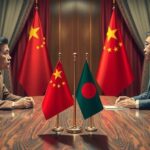Bangladesh Explores Lower Interest Rates on Chinese Loans and Enhanced Cooperation
During a state visit to China, Bangladesh’s interim leader, Muhammad Yunus, was informed by President Xi Jinping about the possibility of lowering interest rates on loans. The discussions included commitments of $2.1 billion in investments and plans for enhanced cooperation in various sectors, signaling a shift in Bangladesh’s geopolitical alliances toward China.
During a recent bilateral state visit to China, Bangladesh’s interim leader Muhammad Yunus was informed by President Xi Jinping that Beijing would consider reducing interest rates on loans to Bangladesh. The talks, described as “comprehensive, fruitful, and constructive” by Yunus’ Press Secretary Shafiqul Alam, also included discussions on enhanced investments and support from China.
President Xi committed to boosting Chinese investment in Bangladesh and aiding the relocation of manufacturing firms. China is looking to strengthen cooperation in critical areas such as water resource management, which was a significant topic during the discussions. Furthermore, Bangladesh secured $2.1 billion in investments, loans, and grants from China.
About 30 Chinese companies pledged $1 billion for the establishment of the Chinese Industrial Economic Zone. In addition, China plans to lend $400 million for the modernization of Mongla port and provide various financial support amounts for continued development in Bangladesh’s economic zones.
The two nations agreed to initiate negotiations for a China-Bangladesh Free Trade Agreement and to optimize their Investment Agreement. Bangladesh reaffirmed its support for the One-China policy, acknowledging Taiwan as part of China. They signed an agreement on economic cooperation and memorandums focusing on cultural exchanges.
President Xi expressed readiness to collaborate on the Belt and Road Initiative, emphasizing areas such as the digital economy, infrastructure, and maritime economy. Yunus, having recently taken office after removing Sheikh Hasina, India’s long-time ally, led discussions that may further shift Bangladesh’s geopolitical alliances away from India towards China, raising possible security concerns for India.
In summary, Bangladesh’s recent diplomatic engagement with China under interim leader Muhammad Yunus has resulted in potential reductions in interest rates on loans and significant investment commitments. The dialogue signified a commitment to deeper economic ties, including trade agreements and cooperation in various sectors. However, this growing relationship with China raises implications for South Asia’s geopolitical landscape, particularly concerning Bangladesh’s historically closer ties to India.
Original Source: www.tradingview.com








Post Comment